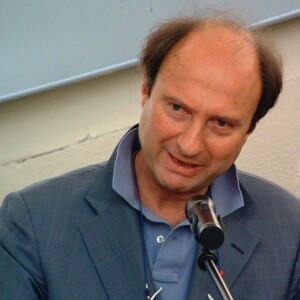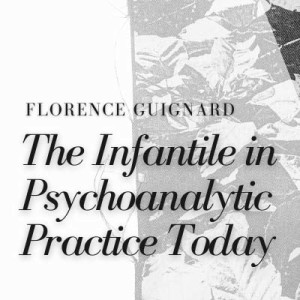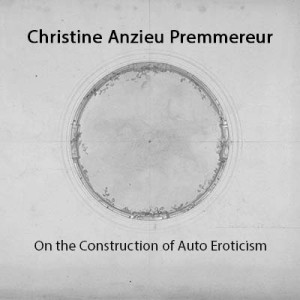Talks On Psychoanalysis
Child Analysis
Episodes

Thursday Oct 12, 2023
Thursday Oct 12, 2023
A plea for a third topicality.An intrapsychic representation of the intersubjective bond,even before the discovery of the object.
Can psychoanalysis be useful with infants? How can we think through concepts of metapsychology with infants? The two Freudian topics are in reference to the instances which are fruit of the completed intrapsychic differentiation process. How can they be useful with infants, who by nature are still undifferentiated and unfinished? In this episode Bernard Golse presents us with his arguments for a third topical approach. Drawing on his extensive experience of parent-infant therapy, he proposes a metapsychology of the primitive pre-object bond, a perinatal topic of mental representation of the intersubjective bond prior to differentiation of instances and object discovery.
Bernard Golse is a child psychiatrist and psychoanalyst (member of the Association Psychanalytiquede France) and Professor Emeritus of Child and Adolescent Psychiatry at the Université Paris Cité. For many years he was head of the Child Psychiatry Department at the Necker-Enfants MaladesHospital in Paris. Among other associative activities, he is presently chair of the European Association of Child and Adolescent Psychopathology and he recently founded the Institut Contemporain de l'Enfance to promote psychological care and support for infants, children, and adolescents, with reference to psychoanalysis, psychopathology and pedagogy with links to the world of arts and culture because of the dialectic that exists between therapeutic creativity and artistic creativity. The three areas in which he has been most involved are early infant development, autism spectrum disorders and adoption issues. He is therefore particularly focused on the question of links.
A subtitled version of this podcast is available on our YouTube channel:https://youtube.com/playlist?list=PLhxiwE76e0QaOquX3GujdwNLFsgxUQNXz&si=yf381EDu3pess6Yz
This episode has been produced in collaboration with Julia-Flore Alibert.
This Podcast Series, published by the International Psychoanalytical Association, is part of the activities of the IPA Communication Committee and is produced by the IPA Podcast Editorial Team.
Head of the Podcast Editorial Team: Gaetano Pellegrini.Editing and Post-Production: Massimiliano Guerrieri.
You can download the written text of this paper from this link:https://docs.google.com/document/d/12dvhD8riz2DSwqYN7a8qOmbIQYndYUyF/edit?usp=drive_link&ouid=112457875385152358388&rtpof=true&sd=true
This episode is available also in French
Recommended Links and Readings:
S. Missonnier and B. Golse, The third topography: a topography of the bond, 89-114. In : Autistic phenomena and unrepresented states – Explorations in the emergence of Self (edited by H.B. LEVINE and J.SANTAMARIA).
Phenix Publishing House Ltd, “Firing the mind”, A.Santamaria Picoanálisis México, Oxfordshire, 2023

Sunday Sep 12, 2021
Sunday Sep 12, 2021
One day, in 1996, with a leap from adjective to noun, a new concept arose within psychoanalytic thought: the Infantile. This term remained so pertinent over time that it has become the core of the title of the 52nd IPA Congress.
Florence Guignard was the author who first formulated it in such an accomplished form, and in today's episode she draws important clinical consequences from the theoretical reflection on this concept concerning the analytic relationship and the interpretative activity of the psychoanalyst in their daily work.
The Infantile -with a capital “I”- is a limit-concept, which aims at describing a "flexible" structure, at the limits of our animality, at the borders of our Unconscious and our Preconscious system. Being the first and main means of organization of our Ego drives, the Infantile is also the place of our primary fantasies and of the mnemonic traces of our first sensory-motor experiences. It is the most acute point of our emotions and feelings in their non-verbal state.
Florence Guignard describes how the patient’s Infantile and the analyst’s Infantile are interweaving in the transference-countertransference situation, as beautifully illustrated by Mikael Vilchez artistic creation, enriched by Rhoda Bawdekar’s interpretation of it. Florence Guignard shows us how the Infantile can serve as a lever in the case of blind spots and stopper interpretations.
A clinical example of a blind spot in the analyst will be published in the second volume of “Psychoanalytic Concepts and Technique in Development. The psychoanalyst in the city”.
Florence Guignard is a Swiss and French psychoanalyst, Training analyst of the Paris Society and a direct member of the IPA for the Training in Child and Adolescent Psychoanalysis. She co-founded the European Society for Child and Adolescent Psychoanalysis.
She is an internationally renowned author and since 1970 her work, translated into several languages, notably on female sexuality and the child, has contrìbuted significantly to the renewal of psychoanalytical thought.
link to the paper https://docs.google.com/document/d/1UC1QF8Yirl8CZ5i42rWwTxvD5_qfwc5B/edit?usp=sharing&ouid=112457875385152358388&rtpof=true&sd=true
This episode is available also in French
Credits© Forbidden Denimeries by Mikael Vilchez, 2021Visual editing and design, Rhoda BawdekarMusic, Chopin Ballade no. 4, Op. 52

Thursday Aug 26, 2021
Thursday Aug 26, 2021
In this episode we’ll listen to Christine Anzieu-Premmereur on the construction of auto-eroticism and the ability to fantasize-dream at the dawn of life.
Christine Anzieu-Premmereur is a PhD Psychologist trained in Paris, an Adult and Child Psychiatrist and Psychoanalyst, member of the Société Psychanalytique de Paris. She moved from Paris to New York in the year 2000 where she has her private practice.
She is a faculty teacher at the Columbia Psychoanalytic Center for Training and Research where she is the director of the Parent-Infant Psychotherapy Training Program, and Assistant Clinical Professor in Psychiatry at Columbia University.
She is the chair of the IPA Committee for Child and Adolescent Psychoanalysis and a member of the New York Psychoanalytic Institute. She chairs the discussion group on Parent-Infant Programs at Psychoanalytic Institutes at the American Psychoanalytic Association meetings.
She has published several articles and chapters on her work as a psychoanalyst of adults, children, and infants with their parents, including recently "A Psychoanalytic Exploration of the Body in Today's Psychoanalysis" published by Routledge, and has collaborated with Dunod on "Le jeu en psychanalyse d'enfants" (Playing in child psychoanalysis) and "Pratiques psychanalytiques avec les bébés" (Psychoanalytic practices with babies).
link to the paper: https://drive.google.com/file/d/1UDFE2VmMO8nhSSliHL5WzPSgKXNYFit1/view?usp=sharing
this episode is available also in French
A Circular ceiling design with clouds and roses, second half 19th century. Jules-Edmond-Charles Lachaise. Courtesy Met Museum, New York.

Monday Jan 11, 2021
Monday Jan 11, 2021
In this podcast we hear from Débora Regina Unikowski about “The baby on the couch”. Here she shares insights about her work with babies and parents, and how this helps us better understand ‘the baby’ within the mind of the adult. These findings provide an illuminating framework for working with patients during the Pandemic. “The baby on the couch” is also the title of her course offered at the Psychoanalytic Society of Rio de Janeiro in 2018, which was also presented at the XXVII Brazilian Congress of Psychoanalysis in 2019.
Débora Regina Unikowski, born in Porto Alegre, is a Training, Supervising, Child and Adolescent psychoanalyst at the Psychoanalytical Society of Rio de Janeiro, and current Director of the Institute for Teaching Psychoanalysis. Her interest in babies and the beginnings of mental life goes back to her internship at the Unité des Petits at the Fondation Rothschild in Paris working with Myriam David, where she observed young at risk children, in the prevention of autism and childhood psychosis. She also worked with pregnant women in Venezuela and participated in the Action-Formation research conducted by Serge Lebovici, observing and treating mothers and babies in a Child Mental Protection Center. Now back in Brazil, in addition to working in private practice in Rio De Janeiro, Débora also disseminates psychoanalysis among health and education professionals.
Some published works:
UNIKOWSKI, Débora Regina. Alicerces da maternidade: função continente da observação psicanalítica e do pediatra. In: ZORNIG, Silvia Maria Abu-Jamra; ARAGÃO, Regina Orth (Org.). Nascimento: antes e depois, cuidados em rede. Curitiba: Honoris Causa, 2011. p.239-245.
UNIKOWSKI, Débora Regina. The development of the maternal feeling in child analysis: Ana and Diana. In: LARTIGUE, Teresa; VARELA, Olga (Ed.). Gender and psychoanalysis: clinical contributions. Aguascalientes [México]: Architecthum Plus, 2013. p.45-50.
UNIKOWSKI, Débora Regina. Desenvolvimento da função simbólica e "analisabilidade". Psicanalítica, Rio de Janeiro, v.17, n.1, p.55-62, 2016.
UNIKOWSKI, Débora Regina. O bebê no divã: reflexões sobre a clínica psicanalítica na primeira infância. Primórdios, Rio de Janeiro, v.5, n.5, p.47-57, 2018.
This episode is available also in Portuguese